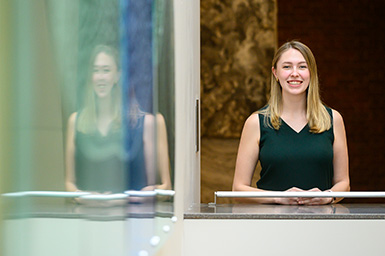
Jessie Stirling (Wa’ya T’so-la) is a Kwakwaka’wakw woman and a member of the Wei Wai Kum First Nation located on the east coast of Vancouver Island. She was brought up on the traditional lands of her people in Campbell River, B.C., and lived on reserve until the age of eighteen.
“Coming to Toronto to attend law school was a big step that took me far away from my community,” said Stirling, who graduated with a Juris Doctor and a Certificate in Aboriginal Legal Studies from the University of Toronto’s Faculty of Law last spring.
“Trying to find a community here in Toronto, after relocating, was difficult. But I was welcomed into the Indigenous Law Students’ Association at the school and was able to build my community outward from there.”
For exemplary academic achievement, steadfast advocacy of Indigenous interests, and extraordinary contributions to the Indigenous community, Stirling was named a recipient of the President’s Award for the Outstanding Indigenous Student of the Year (graduate/professional category).
Stirling and Victoria College student Riley Yesno were both recognized during a virtual ceremony hosted by First Nations House on Feb. 10.
"Jessie's tireless advocacy of Indigenous communities is inspiring," said University Professor and Faculty Dean Jutta Brunnée. "We are so appreciative of her many contributions to the law school and congratulate her on this wonderful, most-deserved honour."
Stirling says there are more Indigenous children in Canada’s child welfare system today than there were at the height of the Residential School System. Recognizing this, she decided early in her legal studies she would advocate for Indigenous children and families as a child and family law lawyer. She is currently articling with the Office of the Children’s Lawyer, an independent branch of the Ministry of the Attorney General.
“Indigenous communities had their systems for caring for their children – ones based on their cultural practices, laws, and traditions – dismantled by colonialism. The move toward reconciliation in Indigenous child welfare is something I am pleased to see, but huge challenges remain. As a lawyer, I want to play a part in addressing those challenges and helping ensure better outcomes for Indigenous children, youth, and families,” says Stirling who expects to be called to the bar in 2021.
During law school, Stirling volunteered extensively with Pro Bono Students Canada (PBSC) in a poverty law clinic and the family courts, with the David Asper Centre’s working group on Indigenous Child Welfare, and with Justice for Children and Youth as a practicum student. She was also an active member of the Indigenous Law Students’ Association (ILSA), serving as its co-president and ILSA’s representative on the Faculty’s TRC Implementation Committee in 2019-2020. Stirling was awarded with a University of Toronto Student Leadership Award last spring in recognition of her leadership, service, and commitment to the university.
"My law school career was immeasurably enriched by the volunteer opportunities I was able to take advantage of at U of T Law, many of which allowed me to serve All My Relations while still a student. I am thankful every day for having had those experiences,” says Stirling.
As a Gerald W. Schwartz Fellow, Stirling was able to spend a summer researching and writing on wrongful convictions of Indigenous and other racialized people in Canada, as part of an ongoing project, the Canadian Registry of Wrongful Convictions, led by Professor Kent Roach and adjunct lecturer Amanda Carling, the Faculty’s Indigenous Initiatives Office (IIO) Manager.
Carling asked if Stirling would have an interest in joining the board of Aboriginal Legal Services (ALS), formerly of Toronto, that now serves Indigenous communities throughout the province. Shortly after becoming a shadow member, Stirling became the board’s secretary and now serves as ALS board chair and president.
“My volunteer work was very much within the law school bubble, so I was looking to get outside of that. I have always tried to prioritize service, especially to the Indigenous community, as an Indigenous woman. To get an education in governance, and to feel like I’m serving communities throughout Ontario is the biggest reward.”
In her final year at U of T, In her final year at U of T, Sterling also coordinated PBSC’s then-new Indigenous Human Rights Program, assisting PBSC and the Ontario Federation of Indigenous Friendship Centres to plan for the launch of free human rights clinics for urban Indigenous people, improving access to justice for Indigenous victims of discrimination. Stirling also conducted research for the First Nations Child and Family Caring Society of Canada under Dr. Cindy Blackstock’s direction and supervision.
"Jessie was instrumental to our success in ultimately launching the human rights clinics," said Brittany Twiss, National Director of PBSC. "Her dedication to the program’s goals, her work ethic, and her commitment to a community-centered approach were so appreciated by our team. Jessie helped lay the groundwork for what has now become a very impactful program and resource for urban Indigenous people."
"Jessie’s deep involvement in the Indigenous community here in Toronto, combined with her dedication to leadership in all her curricular and co-curricular endeavors, make her an ideal recipient for the President’s Award for the Outstanding Indigenous Student of the Year," said Carling. "Her kindness, humility, and sense of humour make her a successful and inspiring leader.”
“I’m very appreciative of having been recognized in this way,” said Stirling in accepting the award. “I’m just so grateful to everyone who has helped me on my path.”

